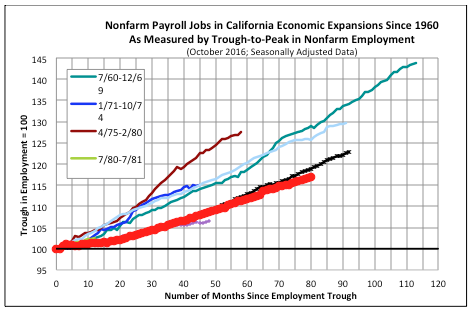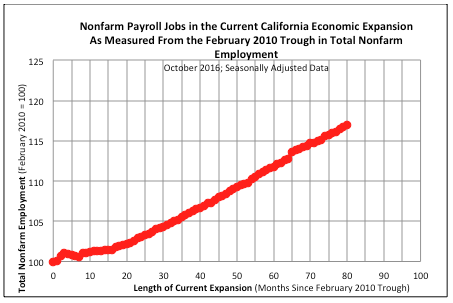 Since February 2010, California has been experiencing near-steady monthly job growth, with a net gain of over 2.3 million payroll jobs from early 2010 through October 2016.
Since February 2010, California has been experiencing near-steady monthly job growth, with a net gain of over 2.3 million payroll jobs from early 2010 through October 2016.
How does this lengthy job expansion compare to previous expansions in California? How long can it continue?
To address these timely questions, we can turn to recent research by Senior Economist Paul Wessen of the California Employment Development Department’s Labor Market Information Division. Mr. Wessen has tracked the employment expansions since 1960, which are shown on the chart above (click to enlarge). Among Mr. Wessen’s main findings:
- Since 1960, California experienced seven economic expansions prior to the current one. The average length of those expansions was 66 months.
- The shortest expansion lasted only 12 months (7/1980 to 7/1981), the longest 113 months (7/1960 to 12/69).
- At 80 months, California’s current expansion is the fourth longest since 1960. Only the 113-month expansion in the 1960s, the 92-month expansion in the 1990s (3/1993 to 1/2001), and the 91-month expansion in the 1980s (12/1982 to 7/1990) were longer.
- Prior to 1990, California tended to experience V-shaped business cycles characterized by comparatively short but painful periods of job loss followed by quick recoveries driven by pent up demand. The business cycle in California has tended to be more U-shaped since 1990, with longer, more drawn out recovery/ expansion periods.
The chart below prepared by Mr. Wessen is a clearer look at the current economic expansion now in its 80th month. It is worth noting that the monthly net job gains have been near steady throughout the entire period, and especially in the past five years of the expansion. In the past year alone, from October 2015 through October 2016, the state added 389,500 jobs.

So how long will this continue? Mr. Wessen offers the following thoughts. “Nobody can really forecast when the current expansion will end with any certainty. The economic fundamentals in California and the nation are still looking pretty healthy, suggesting there is unlikely to be a recession in the foreseeable future. However, the further one looks into the horizon the more uncertain and less distinguishable the future becomes.”
Another of our more prominent California economists, Mr. Chris Thornberg, Founding Partner of Beacon Economics, offers this view. “It is not a recovery anymore. We are well into a normal labor market. As to how long it will last, the answer is that it will continue until it comes to an end. Labor market expansions don’t run out of steam- they are cruelly murdered by some negative economic shock to the system. Up until now, I have not seen any threat to the economy that would cause such a negative shock, and as such- there can be no honest prediction of the end. But we will see once the new Administration begins to more clearly define their true policy priorities.”
Indeed, so far the Dow Jones Index has responded very positively to the new Administration, and we’ll see how this continues in the next months. Mr. Wessen’s research, though, suggests that our lengthy employment growth might continue for some time in 2017, and will not necessarily end after these 80 months.

